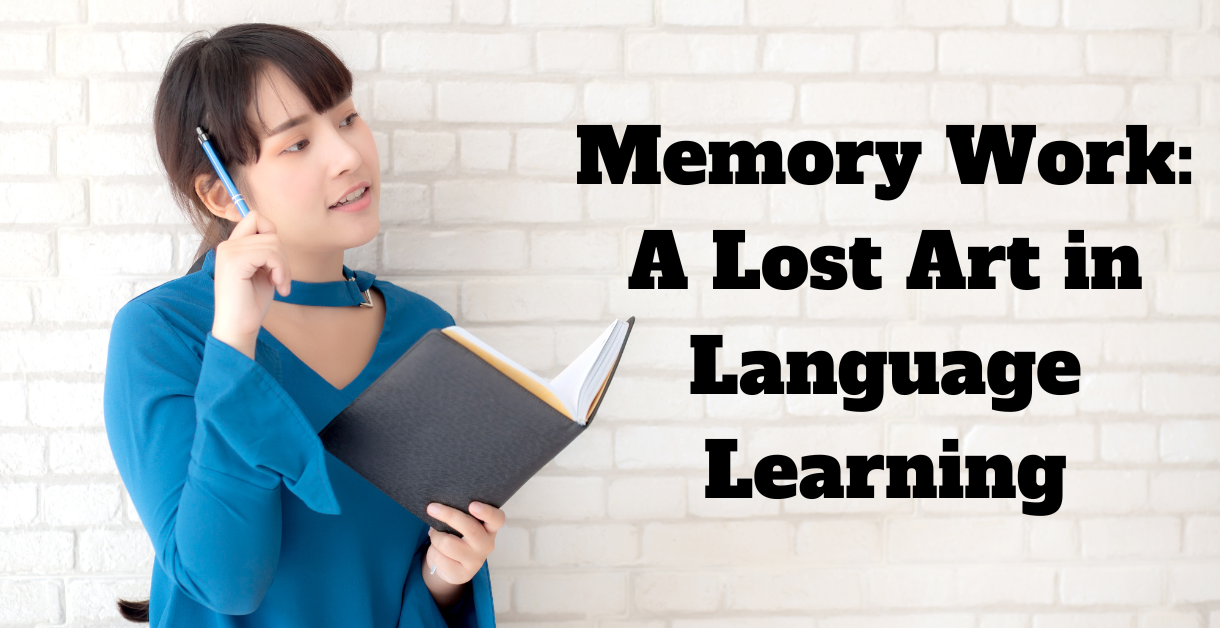I remember when I was in junior high school, my brother would come home reciting dialogues his French teacher had made him memorize. I didn’t think much about it at the time, but I eventually realized that I was very happy myself to be able to learn sentences like this one from my brother: Pauvre petit, vous n’avez pas de chance, vraiment (You poor thing… you just have no luck!). I would gleefully recite this phrase to him when he would miss an overhead smash in tennis or fire up a basketball shot that wasn’t even close to the target.
I credit his French teachers for helping me to begin my French studies. Memory work is so important! I often smile when I hear old ads with copy extolling “No more useless memorization!” Hmmm. The ability to memorize is one trait that truly separates humans from other forms of life on Earth. And it sure comes in handy, for example, to have memorized the word “strawberry” if you are trying to tell the counter-person in a Dunkin Donuts what flavor of doughnut you want. The alternative would be trying to point at the huge display with racks of doughnuts with dozens of flavors. No, up a little, to the right … no, down … no, over, over!
This post will share four reasons why memory work is so important in language learning, offering a few strategies ideal for homeschoolers.
a) Have fun memorizing vocabulary words. New words are the building blocks of a language. Even without being able to conjugate verbs or knowing that adjectives need to agree with nouns in many target languages, having a base of the words for important things (numbers, body parts, clothing, colors, days of the week, description of weather, family members, household or school items, etc.) is an important first step in learning a language. Students will feel very excited being able to identify new things. Use flashcards. Point at objects. Add new words constantly to the words already mastered. Review old ones. It is simple. Have students say words aloud. Hearing helps them to remember.
b) When memorizing new vocabulary, ideally listen to the new words spoken by a native speaker. Most good textbooks have an online component or readily available sound files or CDS (old school!). When your children go to the effort of expanding their vocabulary by memorizing new words, why not have the sounds they are trying to learn be as authentic as possible? You can help by listening to what they say and comparing it with the recorded sample. And share praise, even if their sounds are off a bit. Practice makes perfect. And confidence is SO important for a new learner.
c) Memorizing full sentences helps to cement key grammatical ideas This fact is so true. In my classroom, we often act out short scenes, often made up of just five lines. A student will do the action while repeating each line. If studying reflexive verbs, for example, they will memorize a scene like the following one. Since I teach Spanish, I offer Spanish sentences here, but any target language would work, of course.
| Me siento. | I sit down. |
| Me levanto. | I stand up. |
| Me miro en el espejo. | I look at myself in the mirror. |
| Me peino. | I comb my hair. |
| Me digo: “¡Qué guapo!” | I tell myself: “You look great today! |
After your child or student memorizes this scene, these phrases will come more easily to mind. The reflexive object pronoun “me” will just flow from their lips.
d) Finally, have students memorize sections of dialogue or a poem. In many books, including our series, we have a dialogue adventure throughout our beginning and intermediate courses. Have your children learn a section, memorizing the lines of one character, for example, and then read it aloud with them. You can play the professional recorded audio of the dialogue and hit the pause button when your child’s line come up. Then start the recording to hear the line again, and onto more dialogue until your child’s next part comes up. It is fun. And, believe me, they will remember their lines long past this assignment.
Remember, memory work is both fun and it pays rich dividends!
Special thanks goes to our friends at Breaking the Barrier for sharing with us today.
![]() John Conner is the Founder, Author and Series Editor of the Breaking the Barrier series and has taught Spanish for 40+ years. Breaking the Barrier provides a print/digital curriculum that serves the needs of a variety of homeschool learners in different settings. Homeschoolers across the country have embraced Breaking the Barrier for its standards-based curriculum for middle and high school students who earn course credits. Learners can access native Spanish-speaking conversation coaches through a mobile phone app providing invaluable on-demand live speaking and listening practice.
John Conner is the Founder, Author and Series Editor of the Breaking the Barrier series and has taught Spanish for 40+ years. Breaking the Barrier provides a print/digital curriculum that serves the needs of a variety of homeschool learners in different settings. Homeschoolers across the country have embraced Breaking the Barrier for its standards-based curriculum for middle and high school students who earn course credits. Learners can access native Spanish-speaking conversation coaches through a mobile phone app providing invaluable on-demand live speaking and listening practice.
Now is a great time to add Breaking the Barrier to your classroom. Ending tomorrow, 9/15, you can save up to 25% on Breaking the Barrier at the Homeschool Buyers Club!


